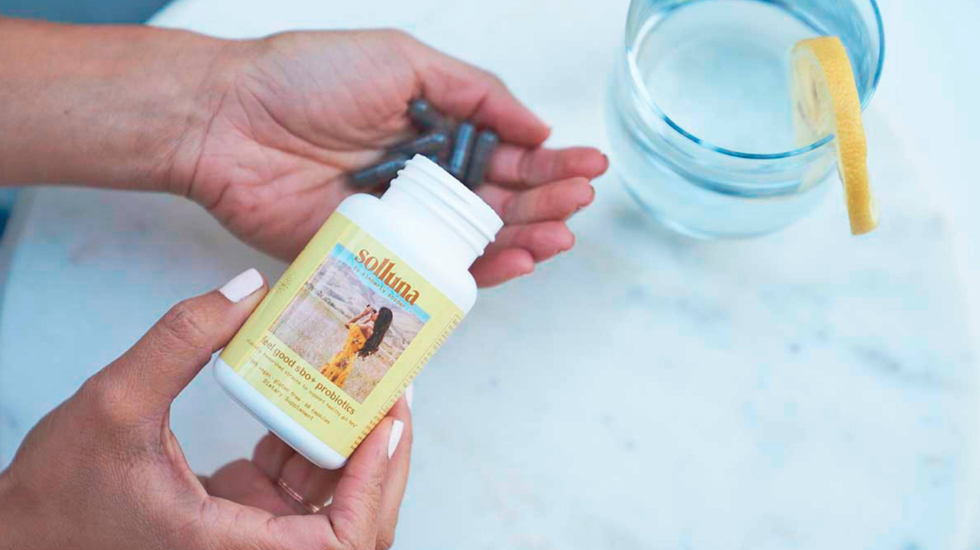
Have you ever wondered if probiotics can help with bloating? While I’ve explored the remarkable benefits of probiotics in various aspects, it’s time to shift our focus and delve deeper into the everpresent burden of bloating.
From supporting a thriving gut microbiome to bolstering the immune system, these beneficial bacteria play a vital role in maintaining overall wellness, the benefits that probiotics offer for your gut health are well-documented.
However, when we encounter specific challenges such as bloating, it becomes essential to understand which probiotic strains hold the key to finding relief and restoring balance.
So Beauty, let’s get right into it. :)
What are Probiotics? A Quick Recap
If you’re here, you probably already know a thing or two about probiotics. For the sake of comparison, we’ll go through this really quick. :)
Probiotics are the “good” bacteria that keep your digestive system healthy, bolster your immune system, and balance your gut microbiome. These virtuous bacteria form a diverse battalion that keeps the “bad” bacteria at bay, preventing them from wreaking havoc on your well-being.
Probiotic supplements consist of seven different types of bacteria:
- Bacillus
- Lactobacillus
- Bifidobacteria
- Escherichia
- Saccharomyces
- Streptococcus
- Enterococcus
Your body doesn’t naturally produce probiotics like it does digestive enzymes, which is why people look to probiotic supplements for better digestion. The right probiotics ensure that plenty of these good bacteria populate your digestive tract and keep you healthy.
Probiotics don’t actively aid in digesting food like digestive enzymes do. However, they do make your digestion more efficient and help promote better overall health.
A thriving and varied gut microbiome is vital to good health, both inside and out.
How do Probiotics Help with Bloating?
Gas production is a natural and normal part of digestion, but if you regularly experience bloating or uncomfortable gas, that’s a sign that something is amiss in your digestive system.
When it comes to conquering bloating, probiotics step up to the plate with their gut-soothing powers. Having a robust population of good bacteria can help make for more easeful digestion, reducing bloating and gas.
Probiotics can be especially effective in combating bloating caused by gastrointestinal disorders like irritable bowel syndrome (IBS). Disorders like IBS can indicate an imbalance in your gut microbiome, or even that your intestines aren’t functioning at their best during digestion. Taking probiotics can help remedy this imbalance in your gut by introducing beneficial bacteria to your digestive system so they can flourish and let you reap their benefits. [1]
When paired with the right digestive enzyme supplement, probiotics can help boost your digestion and get the most out of your healthy diet. However, what strains you introduce can matter a lot more than you may expect.
What Strains are Best for Bloating?
Not all bloating is the same. Bloating can be caused by a variety of factors, not just inefficient digestion. You may also experience bloating if you have intolerance to certain foods like dairy, or as a side effect of your period. Fluid retention can also cause bloating.
While probiotics likely won’t reduce bloating due to intolerance or fluid retention, they can be a helpful ally when it comes to bloating from digestion.
When it comes to bloating, especially with IBS, studies have shown that the most helpful strains tend to be lactobacilli and bifidobacteria. [2]
However, it’s important to note that your gut microbiome is truly unique, and no one’s microbiome is the same as anyone else’s. This means that what may work well for some people’s gut microbiome may not work for yours.
To combat this, it’s best to look for probiotic supplements that contain a diverse array of robust bacteria strains that will flourish and thrive in your gut.
While it’s true that you can obtain probiotics from dietary sources, such as fermented foods like kimchi, sauerkraut, and kombucha, the effectiveness and consistency of probiotic supplementation offer a distinct advantage. While fermented foods contain live active cultures that can certainly contribute to the thriving of your gut microbiome, it can be challenging to ensure a consistent intake and optimal dosage from these sources alone.
The problem is that a lot of probiotics aren’t hardy enough to survive the trip to your gut, which is a big disappointment and waste of money, so choosing the right supplement is essential!
For instance, I fight bloating by taking my Feel Good SBO Probiotics+, which contain a diverse population of healthy bacteria strains that can help address any potential digestive woes, from bloating and gas to constipation.
Related: How to Choose a Probiotic Supplement
How Long Does it Take for Probiotics to Work?
Probiotics aren’t a magic cure for all digestive issues. While you may feel their effects soon after you start, you won’t see instant results after you take your first dosage.
You need to take probiotics on a continuous basis to enjoy their full effect. Remember, better health isn’t something you should be focusing on sporadically. It’s an ongoing process that requires consistency for best results.
Sometimes though, we have days where we may not eat as well as we should, or our digestion is a little sluggish. Life is perfectly imperfect, and as long as you stick to it, you’ll start feeling better and better!
Ultimately, if you’re struggling with bloating, it’s important to take a holistic approach to your gut health. This goes beyond just taking a probiotic supplement.
A Holistic Approach to Gut Health
Embarking on a journey to conquer bloating goes beyond simply relying on probiotics. It involves embracing a holistic approach, nourishing your body with wholesome foods, staying hydrated, and finding solace in stress management techniques.
By addressing the underlying factors that may be contributing to digestive issues, you can make significant strides in improving your overall health and well-being.
Dietary changes play a pivotal role in nurturing a healthy gut. Incorporating whole, nutrient-dense foods such as fruits, vegetables, whole grains, and lean proteins can provide essential nutrients and support optimal digestion.
In tandem with dietary adjustments, adopting lifestyle habits that promote overall well-being can have a profound impact on gut health. Managing stress through practices like meditation, yoga, and regular exercise can help mitigate its negative effects on digestion. Prioritizing adequate sleep, engaging in mindful eating practices, and fostering a positive mindset are all integral components of a holistic approach.
By taking a natural, comprehensive approach to your gut health, you can support your overall health and well-being while reducing bloating and other digestive symptoms.
If you want to get started on your holistic cleansing journey, I also recommend my 3 Day Waterfall Cleanse. It can help give your body that true reset that you’re looking for while paving the way for future success by taking control of your health, physically, emotionally, and spiritually.
Probiotic Powerhouses for Digestion
While probiotics can help with bloating, it’s important to note that they may not be effective for everyone. Bloating can have a variety of causes and addressing the underlying issue is key to finding lasting relief from your digestive woes.
When it comes to choosing a probiotic supplement, it’s important to choose one that will deliver on the health benefits it promises. Most traditional probiotics won’t make the journey to your gut because they’re just not tough enough to survive in your stomach acid. If they can’t survive in your digestive tract, then you won’t benefit from their full effects! On top of that, a lot of them are dairy-derived, so they’re not vegan. However, soil based probiotics can not only survive that hostile environment, but they’re vegan too! Like the name says, these supplements are created with soil based organism (SBO) which can be found in natural, healthy soil.
It’s also important to make positive lifestyle changes to support good gut health, like eating a healthy diet, staying hydrated and managing stress. Probiotics can be a helpful tool in the fight against bloating, but they are just one piece of the puzzle when it comes to digestive health.
In good health,
Citations
- Lembo, Anthony. “Probiotics — Even Inactive Ones — May Relieve IBS Symptoms.” Harvard Health, Harvard Medical School, 22 June 2020, www.health.harvard.edu/blog/probiotics-even-inactive-ones-may-relieve-ibs-symptoms-2020062220303. Accessed 12 May 2023.
- Hungin, A P S, et al. “Systematic Review: Probiotics in the Management of Lower Gastrointestinal Symptoms — an Updated Evidence-Based International Consensus.” U.S. National Library of Medicine, Alimentary Pharmacology & Therapeutics, Apr. 2018, www.ncbi.nlm.nih.gov/pmc/articles/PMC5900870/.







0 Comments